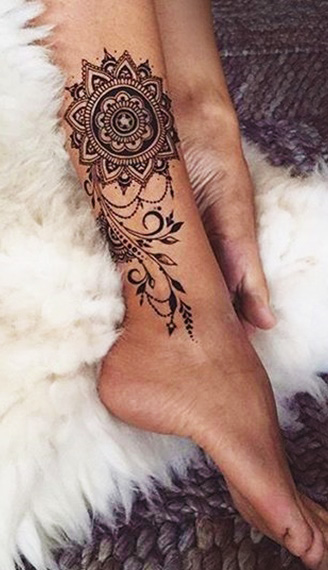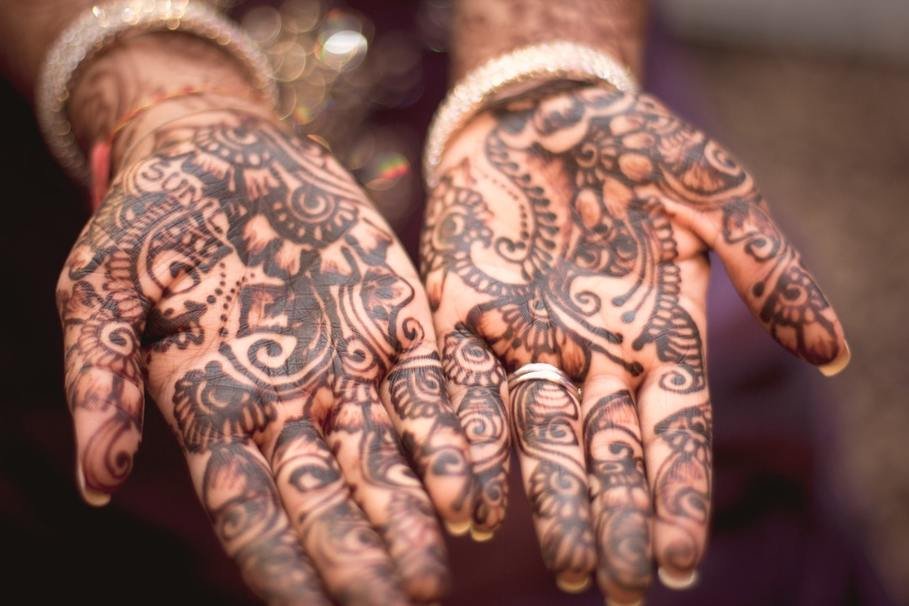Henna tattoos are not permanent. They usually last for around 2-4 weeks.
Henna tattoos, also known as Mehndi, are temporary body art created with the powdered leaves of the henna plant. When applied to the skin, it stains and creates intricate and beautiful designs. These tattoos are popular for cultural celebrations and festivals, as well as for individuals looking for temporary body art.
Unlike permanent tattoos, henna tattoos gradually fade away as the skin exfoliates. They are a safe and natural alternative to permanent ink tattoos. However, it’s essential to note that black henna, which contains harmful chemicals such as PPD, can cause severe skin reactions and should be avoided. Overall, henna tattoos provide an attractive option for those who want temporary body art without the permanence of traditional tattoos.
Contents
What Are Henna Tattoos?
Definition And Origin
A henna tattoo, also known as mehndi, is a temporary body art that involves the application of a dye derived from the henna plant on the skin. Typically, it results in a reddish-brown stain that lasts for a few weeks. Henna tattoos have been a part of various cultural traditions for centuries, particularly in parts of North Africa, the Middle East, and South Asia.
Composition And Application
The henna paste used for creating tattoos is made from the leaves of the henna plant, scientifically known as Lawsonia inermis. The leaves are dried and ground into a fine powder, which is then mixed with water, lemon juice, or other acidic solutions to create a paste. This paste is applied to the skin in intricate designs, often using a cone or syringe-like tool to achieve precise detailing.

How Long Do Henna Tattoos Last?
Many people are drawn to henna tattoos for their intricate designs and temporary nature. But can henna tattoos be permanent? While traditional henna tattoos are not permanent, they can last for a significant amount of time, depending on various factors. Understanding the longevity of henna tattoos can help you make an informed decision before getting one.
Factors Affecting Duration
Several factors contribute to the duration of henna tattoos. The quality of the henna used, the application technique, and the location on the body all play a role in how long the tattoo will last. Additionally, individual skin types and aftercare practices can impact the longevity of a henna tattoo.
Fading Process
Henna tattoos gradually fade over time due to natural exfoliation and skin renewal. Factors such as exposure to water, sunlight, and friction can accelerate the fading process. Proper care, including moisturizing the tattooed area and avoiding harsh chemicals, can help extend the lifespan of a henna tattoo.
Misconceptions About Henna Tattoos
Henna tattoos have been popular for centuries, especially in South Asian and Middle Eastern cultures. While these temporary tattoos are known for their rich, reddish-brown color and intricate designs, there is a common misconception that henna tattoos can be permanent. Let’s delve into some of the misconceptions about the permanency of henna tattoos and clear up any misunderstandings.
Permanency Misconceptions
One of the prevailing myths about henna tattoos is that they can be permanent. Contrary to popular belief, henna tattoos are not permanent but rather stain the top layers of the skin. The dye derived from the henna plant, also known as Lawsonia inermis, tends to fade over time as the skin naturally exfoliates. Unlike permanent tattoos, which penetrate deeper into the skin, henna tattoos gradually fade and typically last anywhere from one to three weeks, depending on factors such as skin type and aftercare.
Another misconception is that black henna can produce permanent results. It is important to note that black henna often contains para-phenylenediamine (PPD), a chemical that can cause severe allergic reactions and long-lasting skin damage. Unlike natural henna, black henna can result in permanent scarring and should be avoided due to its potential health risks.
Understanding The Temporary Nature Of Henna
Discover the truth about henna tattoos and their permanence. While henna is known for its temporary nature, some factors can influence the duration of henna tattoos. Understanding these factors can help manage expectations and provide insight into the longevity of henna body art.
Henna tattoos, also known as Mehndi design, have been a popular form of body art in many cultures for centuries. One of the defining characteristics of henna tattoos is their temporary nature. Understanding the reasons behind this temporary effect sheds light on the fascinating chemical composition of henna and its interaction with the skin.
Henna, scientifically known as Lawsonia inermis, is a natural dye derived from the leaves of the henna plant. This dye is activated when mixed with an acidic liquid and left to rest for several hours. The active compound in henna, lawsone, binds to the proteins in the skin, resulting in a temporary stain that lasts for several days.
The lawsone molecule penetrates only the top layers of the skin, creating a reddish-brown stain that gradually fades as the skin naturally exfoliates. Unlike permanent tattoos, henna tattoos do not involve injecting ink into the deeper layers of the skin, leading to their temporary nature.
The combination of henna’s chemical composition and its interaction with the skin makes it a safe and temporary alternative to permanent tattoos. It also allows for greater flexibility and creativity in designs, as henna tattoos can be easily changed or removed.
The temporary nature of henna tattoos is a result of the intricate chemical composition of henna and its interaction with the skin. This unique characteristic adds to the appeal of henna tattoos as a versatile and safe form of body art.
Potential Risks Of Henna Tattoos
When considering getting a henna tattoo, it’s essential to be aware of the potential risks involved. While henna tattoos are popular for their temporary nature, they can have long-term implications if proper precautions are not taken. Understanding the potential risks of henna tattoos is crucial to making an informed decision before getting one.
Allergic Reactions And Complications
One of the primary concerns with henna tattoos is the risk of allergic reactions and complications. Henna paste may contain a substance called para-phenylenediamine (PPD), which can cause allergic reactions in some individuals. These reactions can range from mild skin irritation to severe allergic dermatitis, resulting in blistering, intense itching, and skin discoloration.
Furthermore, if the henna paste is contaminated or not prepared properly, it can lead to bacterial or fungal infections, adding to the potential complications of henna tattoos.
Long-term Staining And Skin Damage
Another risk associated with henna tattoos is the potential for long-term staining and skin damage. In some cases, the dye in henna paste can penetrate deeper layers of the skin, leading to permanent pigmentation. This can result in undesirable tattoo designs or lingering skin discoloration even after the henna tattoo has faded.
In addition, frequent application and removal of henna tattoos can cause skin irritation and damage, especially if the individual has sensitive skin or pre-existing skin conditions.
Aftercare Tips For Henna Tattoos
Aftercare is crucial in ensuring the longevity of your henna tattoo. By properly caring for your henna tattoo, you can extend its lifespan and enjoy its beauty for a longer time. Here are some aftercare tips for henna tattoos that you can follow to ensure its lasting impact.
Extending The Lifespan Of Henna Tattoos
Extending the lifespan of your henna tattoo is a necessity if you want to enjoy it for a longer period. There are several steps that you can take to ensure the longevity of your henna tattoo:
- Avoid contact with water for at least 24 hours after the henna application to allow the dye to fully develop and set.
- Apply a mixture of lemon juice and sugar to the dried henna design to help set the color and prolong its lifespan.
- Protect your henna tattoo from friction and excessive rubbing to prevent premature fading.
Frequently Asked Questions
Are Henna Tattoos Permanent?
No, henna tattoos are not permanent. They typically last for 1-2 weeks.
Can Henna Tattoos Cause Skin Reactions?
Some people may experience skin reactions to henna tattoos, such as redness or itching.
How To Make Henna Tattoos Last Longer?
To make henna tattoos last longer, avoid excessive water exposure and apply a sealant like lemon sugar.
Do Henna Tattoos Fade Over Time?
Yes, henna tattoos fade over time as the top layers of the skin exfoliate.
Can Henna Tattoos Be Removed?
Henna tattoos will naturally fade over time and can be accelerated with exfoliation techniques.
Conclusion
Henna tattoos are not permanent and will fade over time. However, there are methods to make them last longer. Understanding the factors affecting longevity is key to enjoying your henna tattoo for an extended period. By following proper aftercare and using quality products, you can make your henna tattoo last longer.





